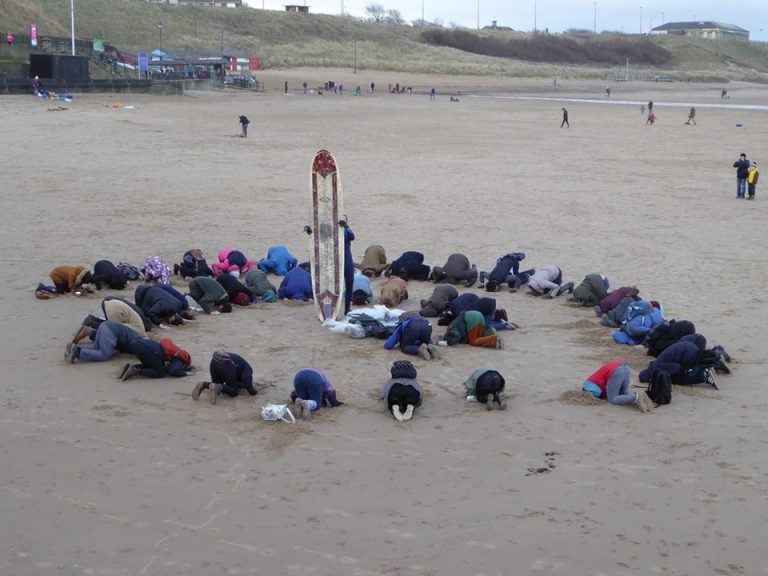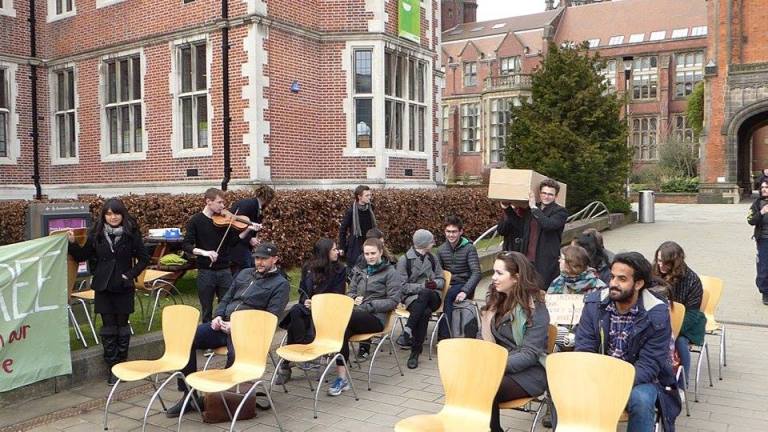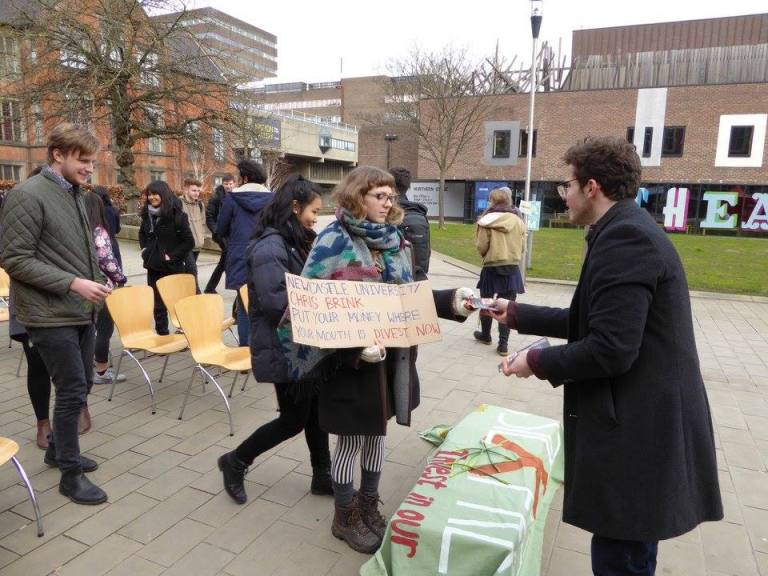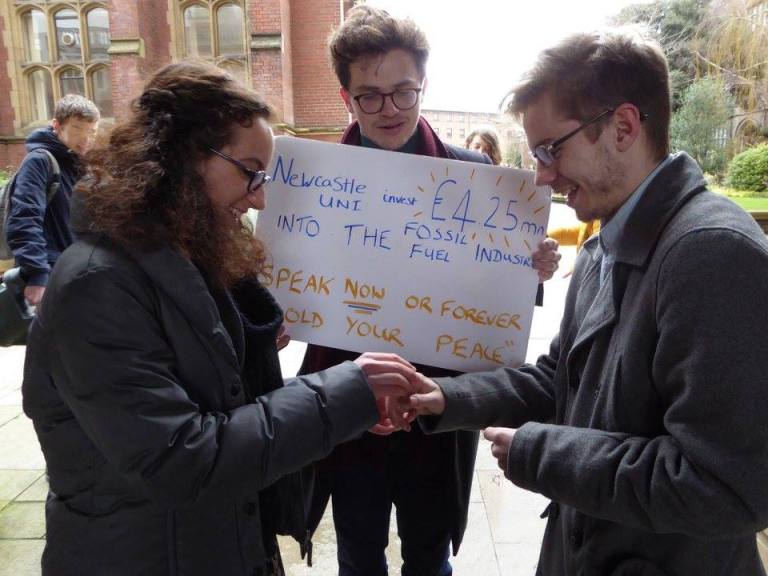Degrees of Change is a series following Fossil Free Newcastle and their campaign to make the university’s investments policy reflect the reality of climate change
By Jack Elliot Marley
Winston Churchill isn’t a figure often evoked in the fossil fuel divestment movement, so it was strange to hear his 1942 address in the wake of British victory at El Alamein, and feel something like similitude.
“This is not the end, this is not even the beginning of the end. But this is, just perhaps, the end of the beginning.”
It’s a Friday night in late February and Cinema Politica are hosting a screening of Naomi Klein’s ‘This Changes Everything’ on campus. After the film Rob Noyes of Fossil Free Newcastle is joined by David Golding, a world-renowned activist with the Jubilee Debt Campaign and north-east coordinator of “Make Poverty History”, a campaign that coloured the wrists and imaginations of a generation with visions of what a world beyond want could look like. Together they chaired a talk on the documentary’s message of rising to the challenge of climate change, opening with the words of the wartime leader.
“They could,” David continued, “with equal justification, be said about the Paris accord. That is, if we put the ‘just perhaps’ bit, in capitals, in bold and underlined.”
Golding’s caveat pricked a nervousness that was shared by many in the theatre. Gloomier still, his memories of COP17 in 2011 exposed a frustration that had in all likelihood only intensified with the magnitude of the crisis in the interim.
“Small wonder, the biting denunciation of our leaders by the outraged young” in Durban that year. One girl had shouted, “’You have been negotiating all my life!’, to roars of approval from the rest of the youth delegation and cries of ‘Get it done! Get it done!’”
How many among those young people would now be content that with the signing of the deal in Paris last year, we had finally “got it done”?
Our own experiences at COP21 were still influencing the movement on campus, and they played no small part in the founding of Renewcastle, a society promoting ideas for sustainable living, from going vegan to powering student homes with renewable energy. In the growing call for a change to the university’s investment policy, Rob Noyes saw the value in a permanent home for the spirit of Divestment Week.
“Part of what Renewcastle stemmed from was a need to show campus presence around the idea of changing the way we live”, he said, “so that we couldn’t be accused of being hypocrites who simply turn around and blame somebody else.”
And with another academic year slipping away, the need to keep up the pressure on divestment was obvious.
“Divestment is a trigger point- something students can really latch on to,” Rob said, and if harnessed correctly it could “change the way they live, in terms of being an active stakeholder in society, rather than someone who gets involved in a divestment campaign once and then goes home.”
Developments on the university’s part had produced the Carbon Advisory Group, a committee elected by Newcastle’s Executive Council to review the demands of Fossil Free, and the feasibility of divestment. In their monthly meetings, they met representatives from Fossil Free. In between references to “throwing the baby out with the bath water” and the apparent need to embrace “stakeholder activism”, it became clear to those in attendance that divestment still seemed too radical to those with the power to enforce it. For many students on the outside however, the “asking nicely” approach to the fossil fuel industry was even more unpalatable.
“If BP wanted to show us that they were really committed to a low Carbon future they would invest in one,” continued Rob. “And if they did, I would have no trouble supporting them.”
When I began following this campaign in the autumn I was invested with the idea that Newcastle was ground zero, the historical epicentre of the coal era and the ultimate birthing place of the climate crisis. As my thinking went, this red brick was fired in the same kiln that fuelled an empire’s rise and lit our path into the modern age. Stephenson, Parsons, Armstrong- the names that decorate maps of our campus suggest we cling tightly to this heritage, even if we grudgingly acknowledge it’s a history that has burdened us with carbon pollution and a future that looks dimmer every day. As such, Newcastle had it in itself to shake the world again by disavowing the ghosts that still haunt these halls and letting in the fresh air of clean energy. But as I have come to realise throughout all of this, things are rarely as simple as they seem, and in Newcastle’s case there is more to be feared of the living, than the dead.
“We have links with BP and Shell, but then there’s also the considerable amount of investment we receive from climate deniers, like Matt Ridley for example.”
And who is Matt Ridley?
“Well, the Ridley Building is named after him” explained Rob, “and quite a lot of funding comes from him. His grandfather and his father were both vice chancellors of the university, and he’s one of the UK’s leading climate sceptic, who also just happens to own the Blagdon estate- the largest opencast coal mine in the UK.”
But while famous investors mumbled public doubts about climate change and the Carbon Advisory Group continued to dribble prose once a month, Fossil Free were campaigning in poetry.
Renewcastle kicked off the spring semester with Go Green Week, a showcase of sustainable lifestyles that complement a student budget. On Valentine’s Day, the festivities culminated in a beach clean-up that engaged students and locals alike, and ended with a symbolic protest against the university’s wilful ignorance on the matter of its fossil fuel money- 42 heads thrust into the sand.

Back on campus, there were Fossil Free Fridays. So far, Fridays at Newcastle University have played host to a wedding and a funeral, with the latter coaxing a not-so-solemn congregation to the steps of the Students’ Union, to witness the burial of their university’s commitment to climate change and read the last will and testament of fossil fuels.


More eccentric still, the wedding depicted in symbolism the nightmare students still grapple with in real terms. Under a muted grey sky, huddled beneath the arches to avoid the worst of the rain, two peculiar families gathered to confront the giving away of the university bride to a sleazy oil tycoon bridegroom.

I caught up with Rebecca D’Andrea, who played the bride, a few days later (presumably in the middle of a torturous honeymoon).
“In the university’s unwillingness to divest, I saw almost a sacred connection with the fossil fuel industry”, she said. “Only the legitimisation would not come from a religious point of view, but from an economic one.”
Liam Christie meanwhile, the shadowy husband of the newly cowed university reflected on how easy it all seemed when students were ill informed.
“The students who walked past didn’t really have a clue what was going on, which is the same with investments. Nobody checks their uni’s investments, and they’re difficult to find.”
With Easter break here the opportunity to reach more students on the issue shrinks to a single semester for many in Fossil Free, with graduation and the future looming. Time is short and the stakes are higher every day.
Rebecca, wistful on the prospect of the challenge ahead, considered what she would tell the university’s Vice Chancellor, Chris Brink, if she were given the opportunity.
“I would tell him to take a day off, alone. Go in a place in the countryside and have a walk around, where very little signs of human impact can be found. Maybe then he would realise what it is that we would lose, and how important it is that we preserve it.”
